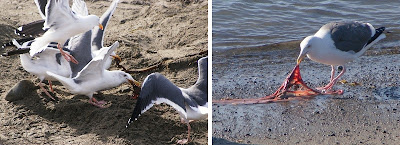As we near the middle of January, more and more black, fuzzy elephant seal pups can be seen as well as heard as they hungrily cry out for still more of that fat-rich milk stored in their moms.
If a pup during its first two weeks of life gets pulled into the ocean too many times, it will probably die from hypothermia as it won't have enough fat to protect it from the chilly waters of the Pacific. As marine mammals, pups can instinctively swim but aren't yet equipped with the necessary body warming fat that they will have after feeding for another week or so.
Click here to see video of shivering pups.
People often ask me how to tell the difference between male and female pups. The easiest way is when you can see the underside, but, of course, the pups don't usually co-operate. So, this means looking at the overall size of the pup, the shape of its head, the shape of its fore-flippers, and its behavior.
Male pups generally tend to be bigger and more rambunctious than their female counterparts. Their heads tend to be broader as do their fore-flippers. Male pups also often tend to boss their moms whereas female pups often look anxious and tend to cry in a more beseeching manner.
After a pup is born, the mom often tries to hide the bloody afterbirth by covering it up with sand. But, the sharp eyes of the clean-up crews of gulls will soon hone in on this delicacy and down they'll swoop.
When visiting the central coast of California, you will not only be treated to the antics of the elephant seals but might also be privy to a variety of activities performed by some of the other inhabitants of the coastal areas.
There are two kinds of egrets that seem to enjoy the coastal bluffs, the great white egret and the snowy egret. Both of whom like to spend hours fishing.
One of the most noticeable and commonly-seen birds is the large carnivorous California vulture - a nervous bird that feeds on members of the animal kingdom that are very dead and smelly. A few days after the death of a pup, vultures, as well as gulls, can often be seen doing their part in keeping the beaches clean as they meticulously devour each scrap of meat on the bones of a poor youngster.
Cheeky brown ground squirrels are also in abundance, and you might even spot a graceful great blue heron.
Returning to Elephant Seal Land, the birthing season is moving swiftly along with the rapid growth of the pups who will only get this fat-rich milk for 3-4 weeks before mom will dash off to feed herself leaving her pup to fend for itself. During this hectic time, males of many ages and sizes will attempt to mate with any and all females whether they're ready or not. ( I'll take this up in my next posting. )
In the meantime, click here for portraits of some cuddly pups.
Subscribe to:
Post Comments (Atom)












No comments:
Post a Comment